
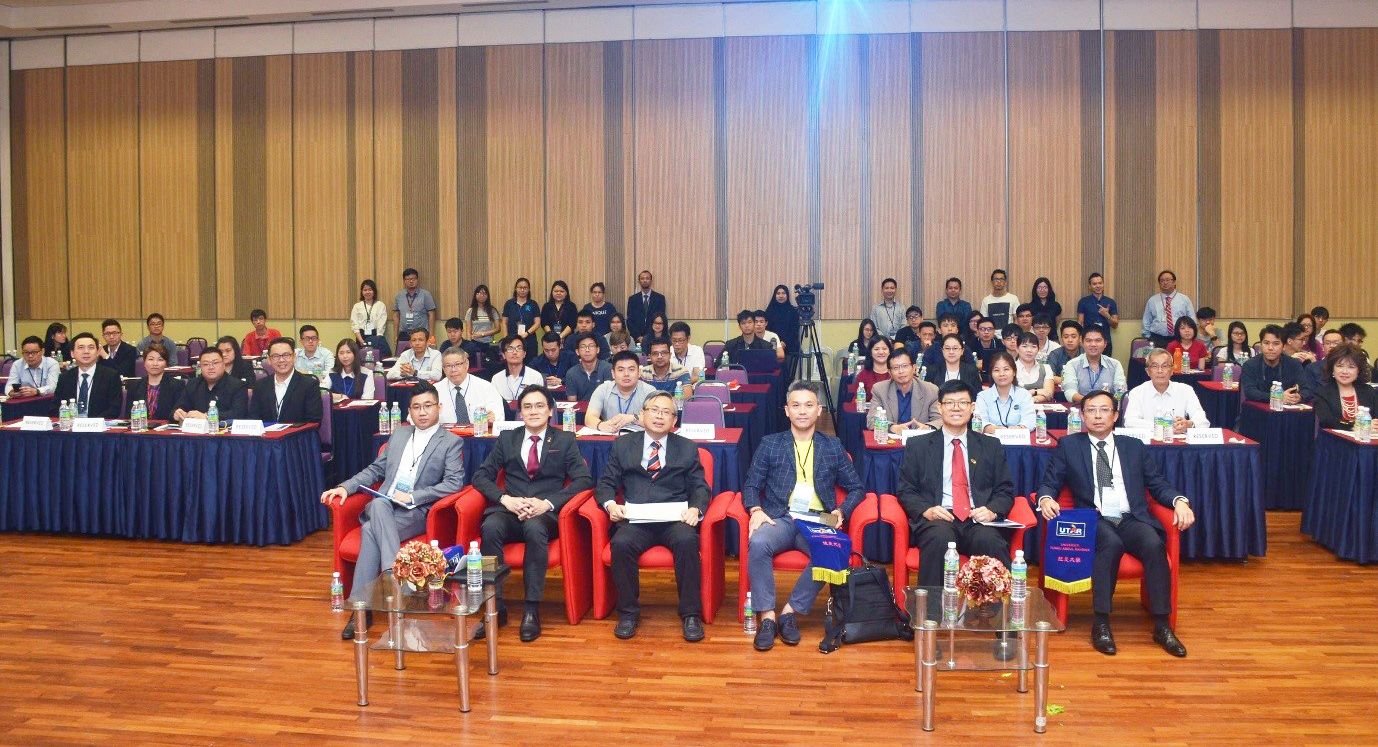
Photography session before the conference
The Student Development and Alumni Relations (SDAR) Group and the Chancellery Department collaborated with UTAR Alumni Association of Malaysia and Fusionex International to organise “Industrial Business Conference 2018: E-commerce and SMEs, a Definite Way Forward” at Sungai Long Campus on 12 April 2018.
The Industrial Business Conference 2018 aimed to highlight the prevalence of Electronic Commerce in today’s business supply chain through the impactful convergence of various cellular and broadband networks, and the continual digitisation of human activities. The conference also seeks to enable participants to understand more impacts on the increase of reach and demands of e-commerce globally and apprise themselves on the advantages of technology and the convenience in applying e-business.
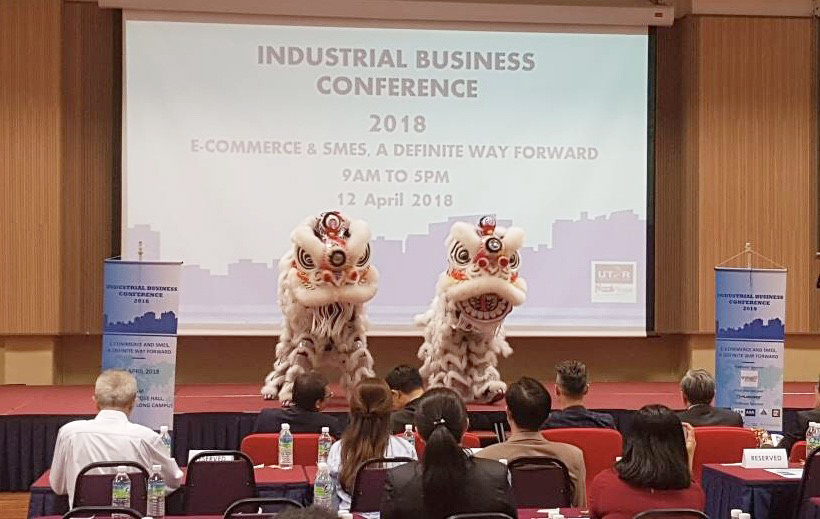
Lion dance performance by UTAR Wushu Club
Present at the event were Vice President for Internationalisation and Academic Development Prof Ir Dr Ewe Hong Tat,Vice President for Student Development and Alumni Relations Prof Dr Choong Chee Keong, HYT Cross Border Sdn Bhd Managing Director Dato’ Dr Danny Tan, Fusionex International AdvFusionex Director and Partnership & Alliances Stan Lee, SME Corporation Malaysia Deputy Chief Executive Officer (I) Rizal bin Nainy, E-Business Association of Malaysia President Danny Ng, Ocean Starlight (Thailand) Director and Founder Eddie Tan, UTAR Alumni Association of Malaysia President Koh Fook Huat, Faculty of Accountancy and Management Deputy Dean of Academic Development and Undergraduate Programmes Dr Hen Kai Wah, participants, students and staff.
Prof Ewe said, “It is not enough to just learn about business from the books and neither is it sufficient to just do business without knowing the basic textbook principles and market strategies. This conference brings together both academia and industry experts for a holistic and all round balanced knowledge so that business could be conducted for greater long-term success.” He added, “Riding on this e-commerce trend, UTAR has also collaborated with Alibaba.com on the ‘Global E-Commerce Talent (GET)’ programme to enhance staff and students’ understanding of e-commerce. We have also incorporated the e-commerce skills and knowledge into our New Village programme and used entrepreneurship skills to guide the New Village in adopting the digital marketing to promote and sell their products beyond the local community market.”
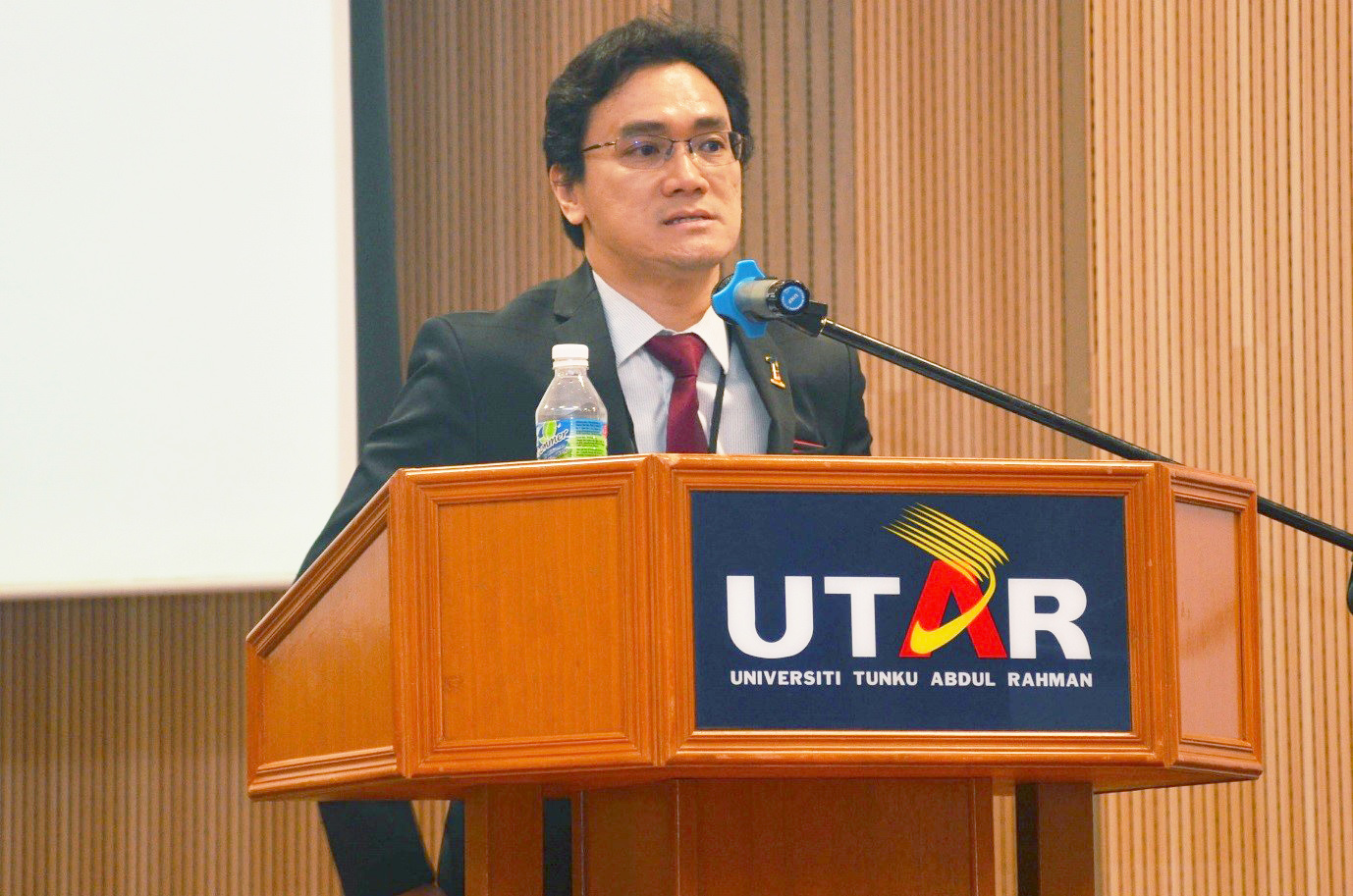
Rizal presenting his keynote speech
“Megatrends are transformative global forces that define the future world with their far-reaching impacts on businesses, societies, economies, cultures and personal lives. We want all SMEs to be part of the digital economy, especially in the e-commerce because it is the fastest way to export their products and services. We would like to collaborate more with our strategic partners through the government as well as the private sectors as there are several roadmaps to help SMEs in their journey and its development programme. This is helping SMEs to chart their journey towards the industry 4.0 as well as the megatrends,” said Rizal in his keynote address.
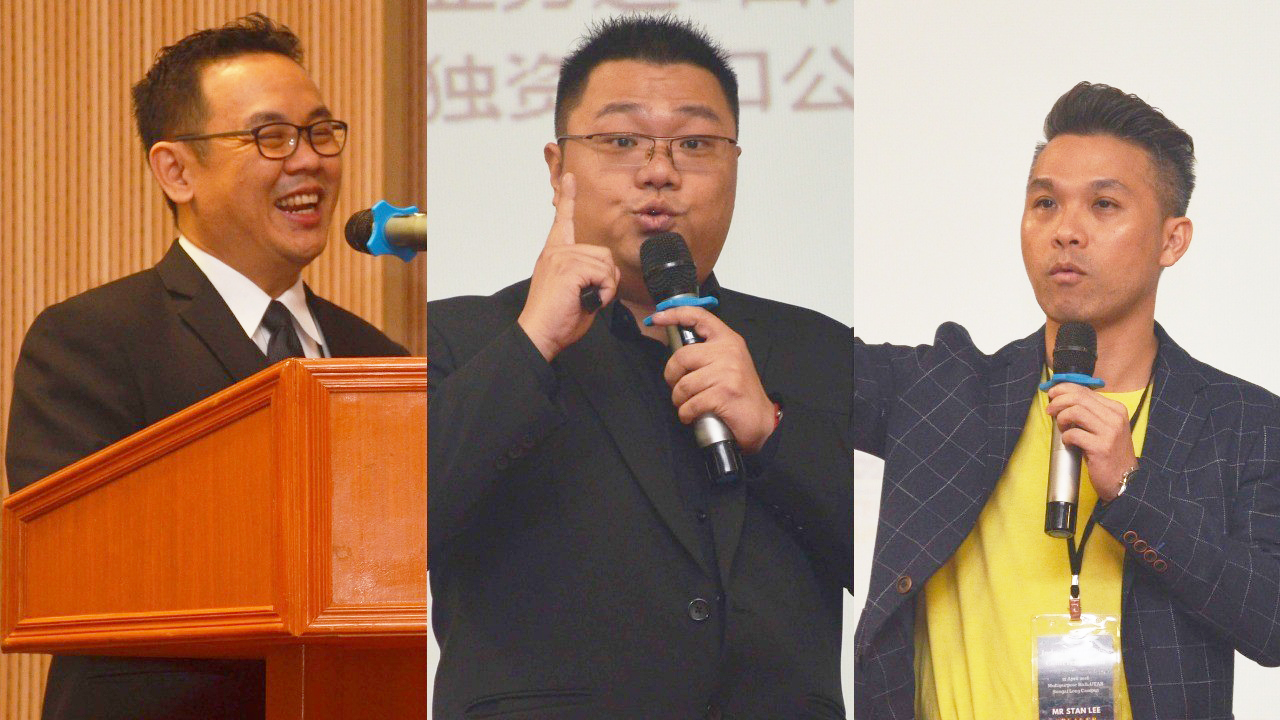
From left: Danny Ng, Eddie Tan and Stan Lee during their talk
Danny Ng shared his experiences titled, “My e-commerce journey in Malaysia and Internationally” with the participants. He spoke about the history of e-commerce and the challenges met during his e-commerce days such as the ever-rising operation cost, dropping of sales margin and stock turn. He also shared on solutions that were implemented to overcome the obstacles and ways to take advantage of the e-commerce trend. He said, “Malaysia online entrepreneurs should make full use of Malaysia Digital Free Trade Zone (DFTZ) facilities and its benefits and also identify financial aids such as soft loans, grants and incentives from the government. We could also seek guidance from various established platforms such as Malaysia Digital Economy Corporation (MDEC), SITEC, MaGIC and many more.”
The conference was followed by another sharing session from Eddie Tan. He spoke about the difference between cross-border e-commerce and typical e-commerce and processes involved in exporting products to China’s market. “It’s important to know your target audience, consider your resources and business models before entering the market. There is a need for one who wishes to enter the China market to understand the China trading policies, import taxes, import permits, and examination reports.”
Before the networking session, Stan Lee presented his talk titled “World Trend for 2018 and Beyond” which focused on the current business trends. He gave an overview of the working environment in Fusionex and shared on how data could help one to succeed in e-commerce. He said, “E-commerce in the future is going to be driven by Artificial Intelligence. We need to use technology to its advantage to remain relevant in the market. Data is the king and in any e-commerce, you must be able to capture, understand and analyse the data. Action change things! Don’t think of what to sell, you need to think about what people would like to purchase. We need to look at data and learn to connect with the buyer at different platforms which is also known as social media marketing.”
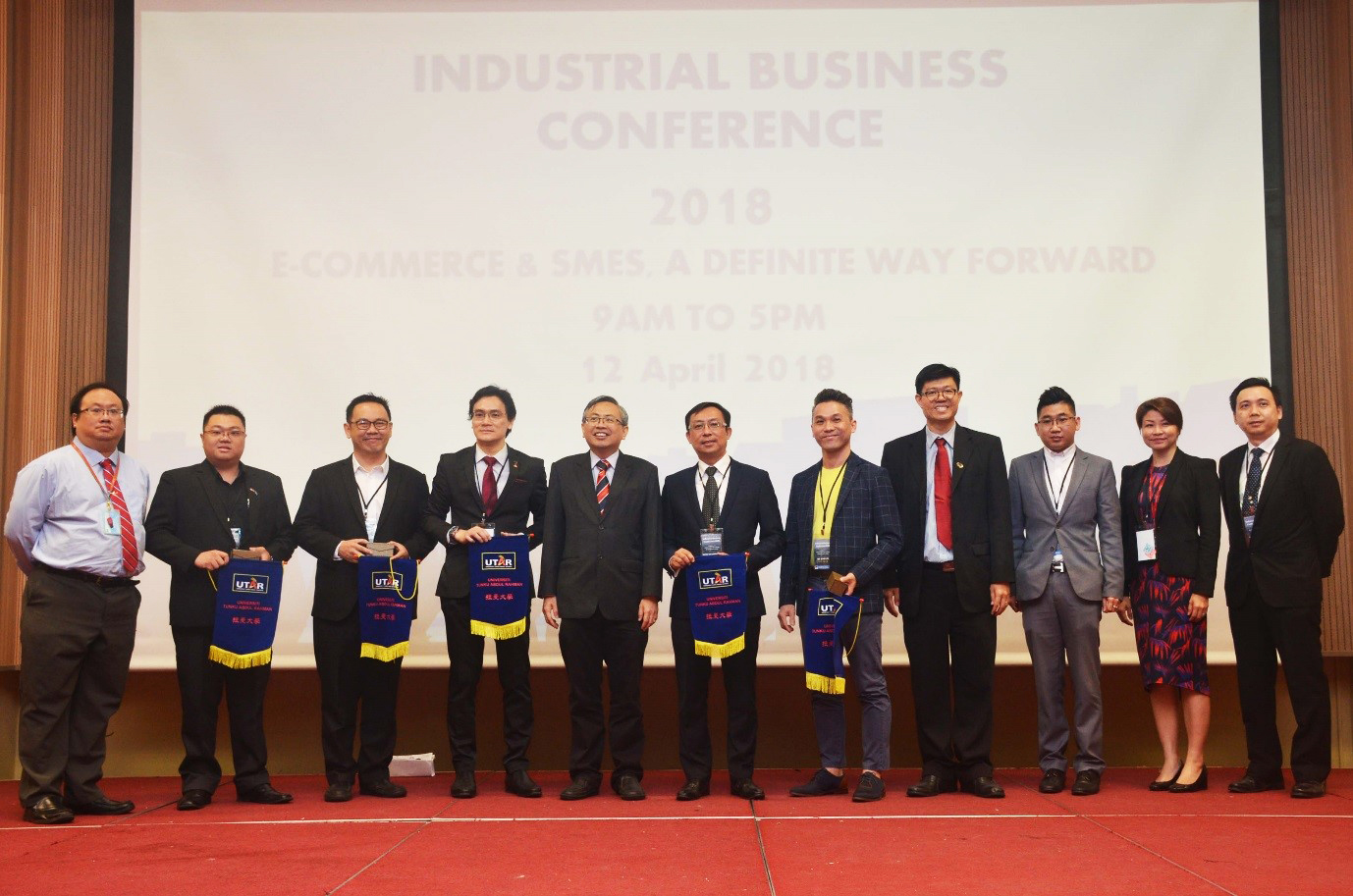
From left: Maxwell, Eddie Tan, Danny Ng, Rizal, Prof Ewe, Dato’ Danny Tan, Stan Lee, Prof Choong, Koh, Dr Winnie and Dr Hen during the souvenir presentation
The event was followed by a forum featuring speakers from Youth at MDEC Manager Special Projects Premla Balakrishnan, HYT Cross Border Sdn Bhd Advisor Dr Ch'ng Soo Ee, Eddie Tan, Stan Lee, Danny Ng and Lee Kong Chian Faculty of Engineering and Science Head of Master of Information Systems Programme Dr Winnie Wong Whee Yen. They discussed the opportunities and challenges SMEs face in the e-commerce platform. The forum was moderated by Faculty of Creative Industries lecturer Maxwell Sim Yik Seng.
“As you may already know, the China market is huge with a potential of more than 100,000 factories and brands who wish to promote their product in Asia. The people in China are very skilled in e-commerce platform. They have their own technology, techniques and skills but when it comes to penetrating the Asian market, they often come down to one problem, the language. Language has always been a barrier for them. Besides language, our culture, tax and government policies are also a setback for them. So, SME’s in Malaysia can use this opportunity to learn and work together with them to excel in the e-commerce industry,” said Eddie Tan.
Stan Lee said, “One of the key advantages of SMEs is its nature of being young, therefore it can change rather quickly. It is also new, hence it can adapt and adopt to the new way of moving forward. The mindset is an area I would like to emphasise on. Opportunity is plenty when you decide that this is something you want to do. You must be daring to explore and embrace the change. That is why the mindset plays a big role.”
Premla said, “Opportunities for SMEs and SMIs are abundant in Malaysia. This is because we are rich with a variety of cultures and that gives birth to a plenty of home-grown products. This is why we introduced DFTZ. We want our home-grown products to be visible out there in the cross-border e-commerce arena.”
Agreeing with Premla, Dr Ch'ng added, “ There is a lot of initiatives and support given by the government for the SMEs to make use of. Besides, there is also a lot of training provided for the SME’s with readily available platforms. They simply have to grab the chance.”
Dr Winnie Wong said, “The industry is hungry for talent pool. It is looking for a talent pool that is multi-skilled and knowledgeable in almost all areas of studies, a talent pool that is ready to help the SMEs and SMIs to begin the entire operation of e-commerce. This is one of the challenges we often encounter. The demand of the industries is often not easy to meet because it is very difficult to find a person, readily available, with all these skill sets.”
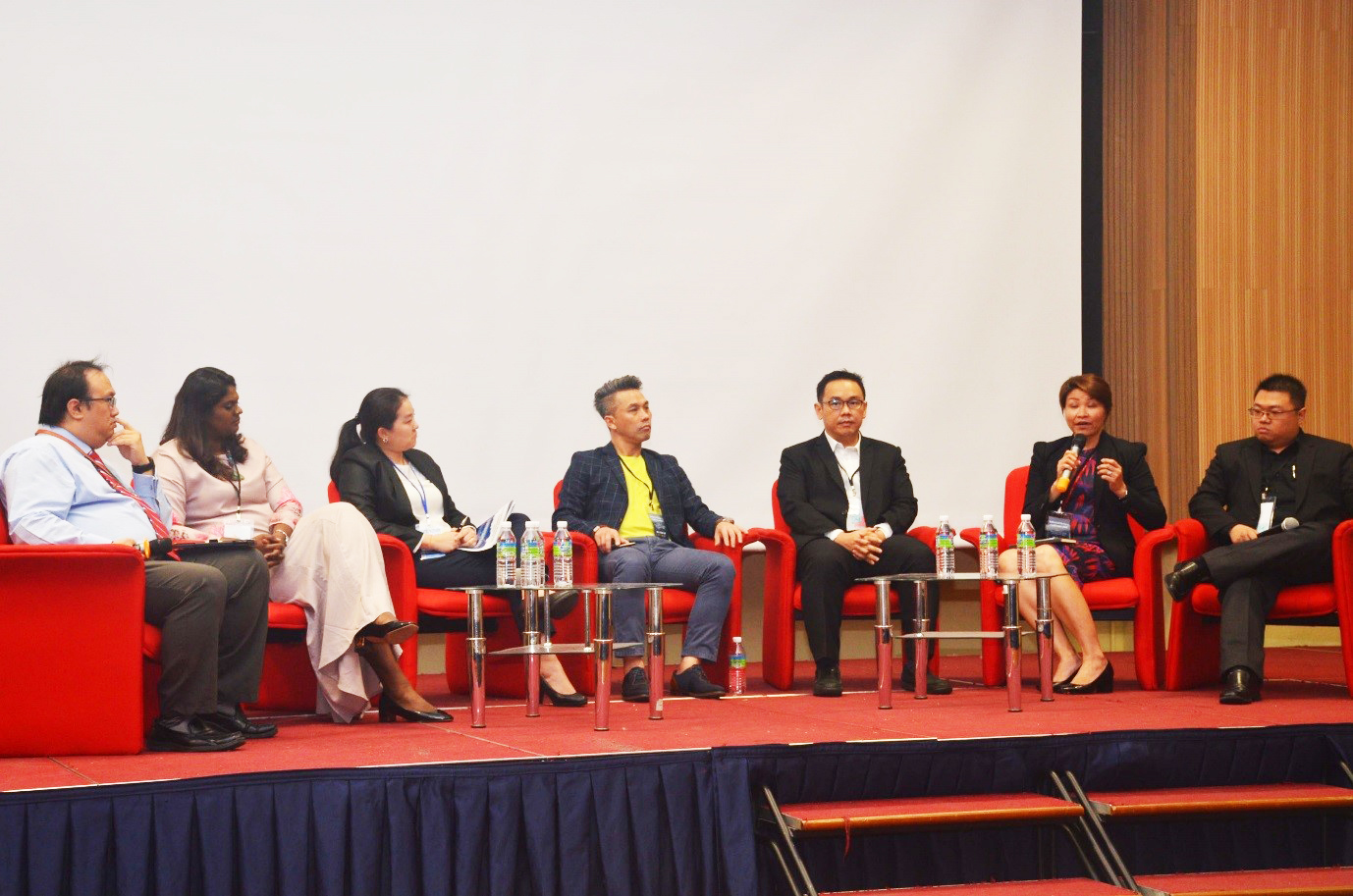
The panellists during the forum
Danny Ng said, “Malaysia is a very strategic place, hence it has gained the attention of many China companies and brands. We can leverage our strengths in the areas that China may need our help with. For instance, Facebook, Instagram and Youtube are platforms that are denied access in China, but not in Malaysia. We can assist them in marketing their products on these platforms. Thus, in terms of opportunity, these are some areas where we can use our strength to grow bigger in Malaysia.”
The forum was followed by a session on “ Unleashing the Power of e-commerce among SMEs: The Role of University”. The session was conducted by Dr Hen. There were several initiatives taken by UTAR to promote e-commerce, namely e-commerce human capital development, collaboration with the industry players, service and consultancy for SMEs, training and seminars and awareness programme. He said, “We have included e-commerce syllabus into our existing curriculum as both core and elective courses. We also provide hands-on practical projects for the students to experience real e-commerce. Besides, workshops are conducted for both staff and students to enhance their teaching and learning experience.”
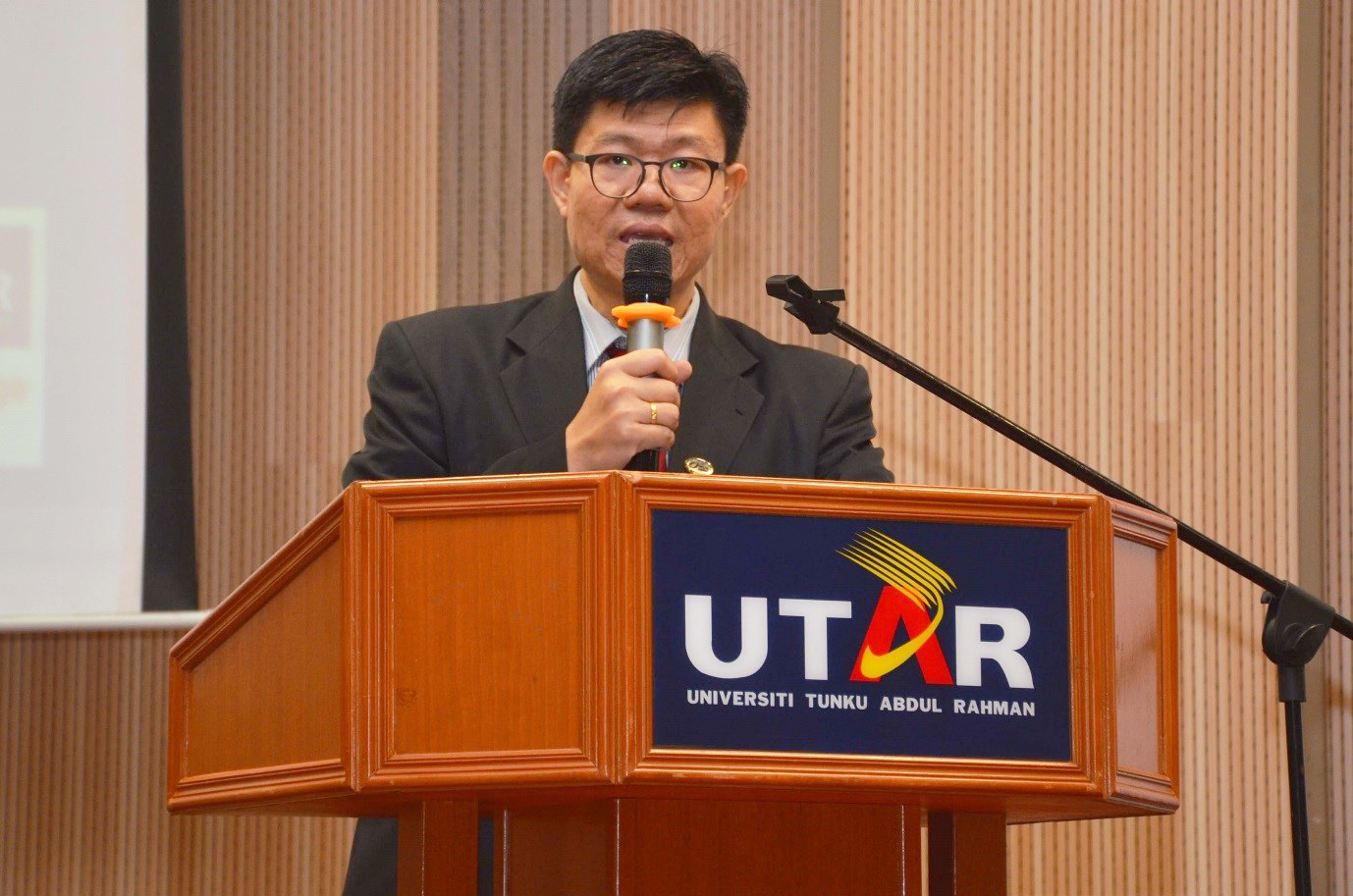
Prof Choong delivering his closing remarks
Prof Choong said, in his closing remarks, “ This Industrial Business Conference 2018 indeed played an important role in bringing all relevant parties, namely the prominent industrial practitioners, academics and government-linked companies (GLCs) to share their knowledge and build networks. I would like to thank the working committee members and UTAR staff for their tireless effort in planning, organising and executing the event. I would also like to thank our collaborating partners, Fushionex International, UTAR Alumni Association of Malaysia, distinguished speakers, sponsors and all participants for your support.”
The event ended with a group photography session.

The conference saw some products sold at booths
© 2019 UNIVERSITI TUNKU ABDUL RAHMAN DU012(A).
Wholly owned by UTAR Education Foundation Co. No. 578227-M LEGAL STATEMENT TERM OF USAGE PRIVACY NOTICE